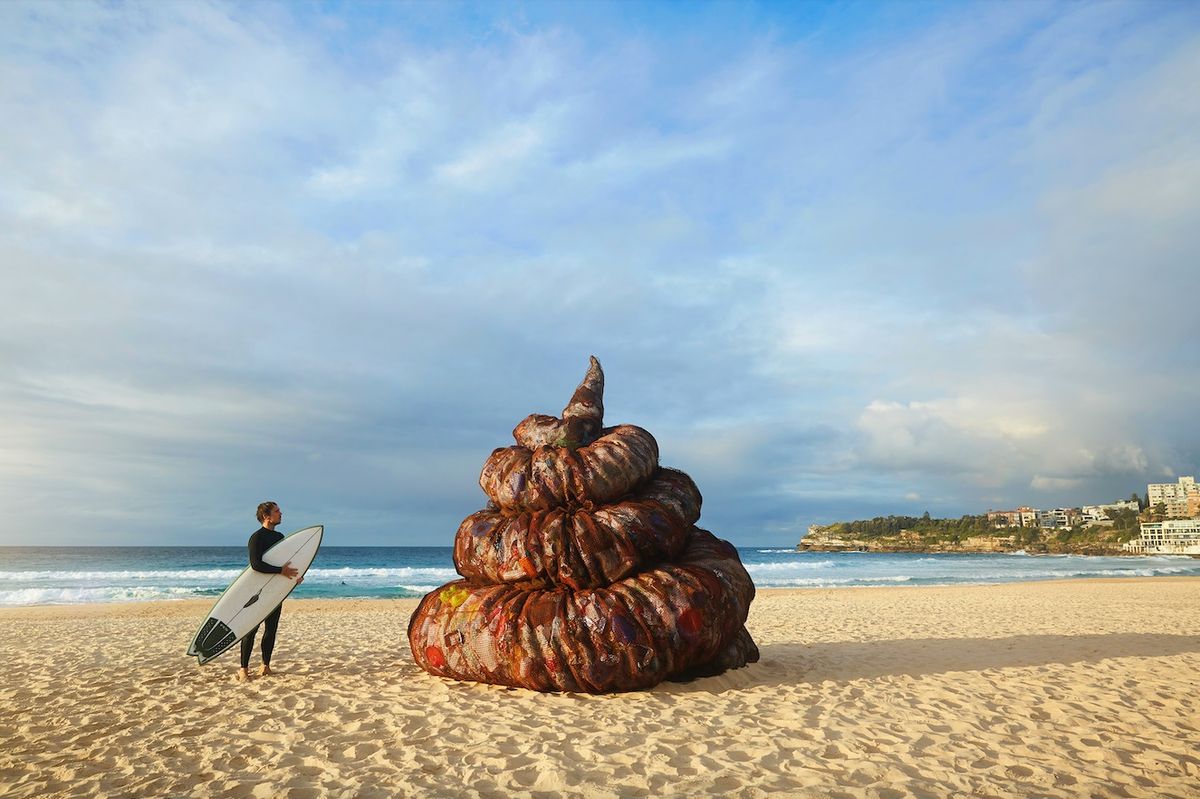Better Packaging Co. urges companies to cut 'the sh*t' and four more creative ocean plastic campaigns.
Advertising and PR Campaigns to stop ocean pollution consistently offer examples of some of the most creative thinking in the industry. Here are a bunch of such campaigns starting with this belter from Better Packaging Co.

Advertising and PR Campaigns to stop ocean pollution consistently offer examples of some of the most creative thinking in the industry. Here are a bunch of such campaigns starting with this belter from Better Packaging Co.
POLLASTIC | Better Packaging Co. | Special | 2023
According to a recent report by the UN Environment Programme (UNEP), global plastic pollution could be reduced by 80% by 2040 through practical and affordable changes, including increased plastic reuse. To raise awareness of this issue, Better Packaging Co. collaborated with Special to create a giant installation shaped like a poop emoji that represents the amount of 'plastic shit' dumped into our oceans every 30 seconds. It also acted as a metaphor for businesses to 'cut the sh*t' and adopt sustainable practices. The company backed up its punchy positioning with a new range of sustainable products made from 80% to 100% recycled plastic pollution retrieved in Southeast Asia.
This Is Not A City | Corona | DDB | 2022

Turn plastic waste into a submerged city capable of destroying the ecosystem to show people the problem of ocean plastic waste. Every year, 12.7 million tons of plastic waste bury the bottom of the sea, damaging our natural paradises. It is expected that by 2050 there will be more plastic than fish in the sea. Therefore to raise awareness and show people the problems that single-use plastic creates, Corona in partnership with DDB transformed plastic waste into a submerged city capable of destroying the ecosystem. The outdoor campaign encouraged people to into plastic reality.com and join Corona’s NET-ZERO plastic footprint movement.
Plastic Fishing | Corona | We Believers | 2021
Challenge fishermen to fish for the most plastic. In Mexico, over 750 million pieces of plastic end up in the sea each year. Instead of allowing the plastic caught by fishermen to be thrown back into the ocean, Corona created a campaign that turns the plastic into money. Usually, fishermen dispose of the plastic that they catch without realising that it can be sold. This campaign from beer giant Corona encouraged fishermen to catch as much plastic as they could as part of a Plastic Fishing Tournament. The incentive? Corona would buy the plastic by the kilogram for the same price as fish. The brand also connected fishermen with local recycling companies so that they could receive a second income from the rubbish that often fills their nets.
Dead Whale | Greenpeace | Dentsu | 2018
Challenge perceptions on whales being injured by ocean plastics by creating a beached whale solely from plastics. In this powerful campaign, Greenpeace Philippines aimed to raise awareness about the devastating impact of plastic pollution on marine life. The campaign featured a graphic installation of a dead whale made entirely out of plastic waste collected from the ocean. The disturbing artwork was showcased in a highly visible public space, aiming to shock and engage the public, urging them to take action against plastic pollution. The installation served as a poignant reminder of the urgent need to address this environmental crisis. Greenpeace hoped that the campaign would encourage individuals, businesses, and governments to adopt sustainable practices, reduce plastic consumption, and protect our oceans and the creatures that called them home.
Trash Isles | LadBible | AMV BBDO |2018
Make ocean trash legally unignorable to UN Officials by creating an island made of trash that legally exists. An area of plastic trash the size of France pollutes the Pacific Ocean. Yet Governments routinely ignore it. So The Plastics Oceans Foundation and LadBible found a way to make the issue unignorable. It submitted an application to the UN to recognise The Trash Isles as an official country. Now granted, this petition compelled nations to discuss how to clean it up. In Dave Trott’s language, this is an example of getting upstream of the original problem.
And a bonus... this related campaign has a fantastic medium is the message idea based on fishing waste rather than plastic waste.
Catch Of The Day 2050 | Sea Shepherd | Ogilvy | 2022

Disguise fishing nets as fish to raise awareness of overfishing. This impactful campaign highlights the alarming consequences of overfishing. The campaign showcased a fictitious fish market set in the year 2050, where fish species had become extinct. The fish market with grotesque displays of fish made from old fishing equipment aimed to provoke awareness about the future of our oceans. The campaign garnered significant attention and sparked conversations around sustainable fishing practices and the need to protect marine biodiversity.
